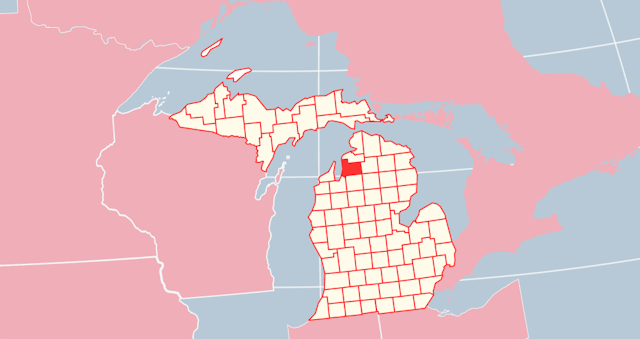Rehabs in Antrim
Antrim is a county located in Northern Michigan. The name is coming from a county with the same name in Northern Ireland. The seat is village Bellaire.
This region is surrounded by lakes and forests. The beauty of nature attracts many tourists.
From 2009 to 2010, the state of Michigan was one of the top 10 states where illicit drug use is more spread than marijuana.
According to the Michigan Department of Health and Human Services, starting in 2019 the amount of death caused by drug overdose is decreasing.
Unfortunately, in this region, many people also need to get help, but there are no rehabs in Antrim County. Luckily, near Bellaire, many facilities offer both outpatient and inpatient programs.
Antrim County Rehabs
Although in Antrim there are no rehabs, one can find a facility near it, where he can receive the needed treatment.
The nearest centers to Bellaire are in Owosso, Howell, East Lansing, etc.
For example, in Owosso, DOT Caring Center offers an outpatient treatment program. Treatment approaches include cognitive therapy, dialectical behavioral therapy, trauma-related counseling, etc.
Similarly, to receive the inpatient method, patients will have to travel. The nearest place where there are facilities with residential care is Ingham. Holden House is in Lansing, which is around 24 miles from Bellaire. The center offers short-term and long-term residential care. The treatment approaches include cognitive and behavioral therapies, substance abuse counseling approach, and trauma-related counseling.
Treatment Methods in Rehabs near Antrim County
In general, the recovery path patients start with getting an assessment. In the rehabs mentioned above or in most centers in this region, therapists will help clients.
Secondly, patients clean their bodies of substances. In most cases, therapists recommend detoxing their bodies in clinics. Sometimes, patients will need to take pills to minimize withdrawal symptoms.
After detox, therapists recommend one of the following methods
Outpatient
Inpatient
Short-term and long-term inpatient
Outpatient Plan
This type of cure always comes after the residential. It may last up to six months. The duration depends on the severity of the case.
Or, if the case is not so severe, after the detoxification therapists may recommend this plan.
The services that provide the centers in this region include
Individual therapies with patients and their family members
Support group sessions
Classes for relapse prevention
Medical control, etc.
Inpatient Plan
In general, it is the most recommended type of care. The duration is 30 days. The plan includes all the therapies and classes that are offered during outpatient care.
All this time patients are under the control of professionals 24/7. It helps to stay away from the triggers and prevent relapses that may happen.
Short-Term and Long-Term Plans
General residential care lasts 30 days. But, sometimes, it may be more or not enough.
The short-term cure is less recommended. It lasts two weeks.
The long-term cure lasts from 60 to 90 days. This type is always recommended in severe cases.
Both types of cure include therapies and classes as in general residential care.
Prices and Payment Methods
In fact, the outpatient method costs less than the inpatient. This depends on many factors such as the location of the center, the number of hours or days spent in facilities, treatment approaches, etc.
Luckily, clinics here accept state-finance health insurance or private insurance. Many of them offer a sliding fee scale. This means that the fee is based on income, waste, and many other factors.
Although the recovery path is hard, and it may cost high, it is very necessary to get rid of a habit that affects people's lives in a bad way.

